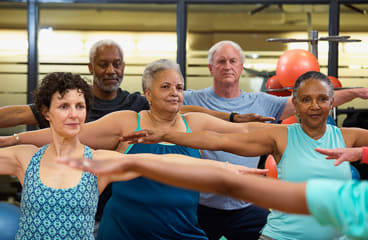What is physical activity?

Being physically active means doing any kind of activity that gets your body moving.
The types of physical activity that can help you get fit and stay healthy include:
- Aerobic or "cardio" activities. These make your heart beat faster and make you breathe harder, such as brisk walking, riding a bike, or running. They strengthen your heart and lungs and build up your endurance.
- Strength training activities. These make your muscles work against, or "resist," something. Examples include lifting weights or doing push-ups. These activities help tone and strengthen your muscles and bones.
- Stretches. These let you move your joints and muscles through their full range of motion. Stretching helps you be more flexible.
Reaching a balance between these three types of physical activity is important because each one contributes to your overall fitness.
What are the benefits of being active?
Being active is one of the best things you can do for your health. It helps you to:
- Feel stronger and have more energy to do all the things you like to do.
- Focus better at school or work.
- Feel, think, and sleep better.
- Reach and stay at a weight that is healthy for you.
- Lose fat and build muscle.
- Lower your risk for serious health problems, including diabetes, heart attack, high blood pressure, and some cancers.
- Keep your heart, lungs, bones, muscles, and joints strong and healthy.
How can you make being active part of your life?
Start slowly. Make it your long-term goal to get at least 30 minutes of exercise on most days of the week. For many people, walking is a good choice. Or you may want to swim, bike, or do other activities.
Pick activities that you like—ones that make your heart beat faster, your muscles stronger, and your muscles and joints more flexible. If you find more than one thing you like doing, do them all. You don't have to do the same thing every day.
Get your heart pumping. Any activity that makes your heart beat faster and keeps it at that rate for a while counts.
Here are some great ways to get your heart beating faster:
- Go for a brisk walk, run, or hike.
- Go for a swim or bike ride.
- Take an online exercise class or dance.
- Play a game of touch football, basketball, or soccer.
- Play tennis, pickleball, or racquetball.
- Climb stairs.
Even some household chores can count as activity. Just do them at a faster pace. Raking or mowing the lawn, sweeping the garage, and vacuuming and cleaning your home all can help get your heart rate up.
Strengthen your muscles during the week. You don't have to lift heavy weights or grow big, bulky muscles to get stronger. Doing a few simple activities that make your muscles work against, or "resist," something can help you get stronger. Aim for at least twice a week.
For example, you can:
- Do push-ups or sit-ups, which use your own body weight as resistance.
- Lift weights or dumbbells or use stretch bands at home or in a gym or community center.
Stretch your muscles often. Stretching can help you stay flexible.
When you stretch:
- Do it slowly. Stretching is not about going fast or making sudden movements.
- Don't push or bounce during a stretch.
- Hold each stretch for at least 15 to 30 seconds, if you can. You should feel a stretch in the muscle, but not pain.
- Breathe out as you do the stretch. Then breathe in as you hold the stretch. Don't hold your breath.
If you're worried about how more activity might affect your health, have a checkup before you start. Follow any special advice your doctor gives you for getting a smart start.
Where can you learn more?
Go to http://www.healthwise.net/patientEd
Enter W332 in the search box to learn more about "Learning About Being Physically Active".
Current as of: September 24, 2025
Author: Ignite Healthwise, LLC Staff
Clinical Review Board
All Ignite Healthwise, LLC education is reviewed by a team that includes physicians, nurses, advanced practitioners, registered dieticians, and other healthcare professionals.

